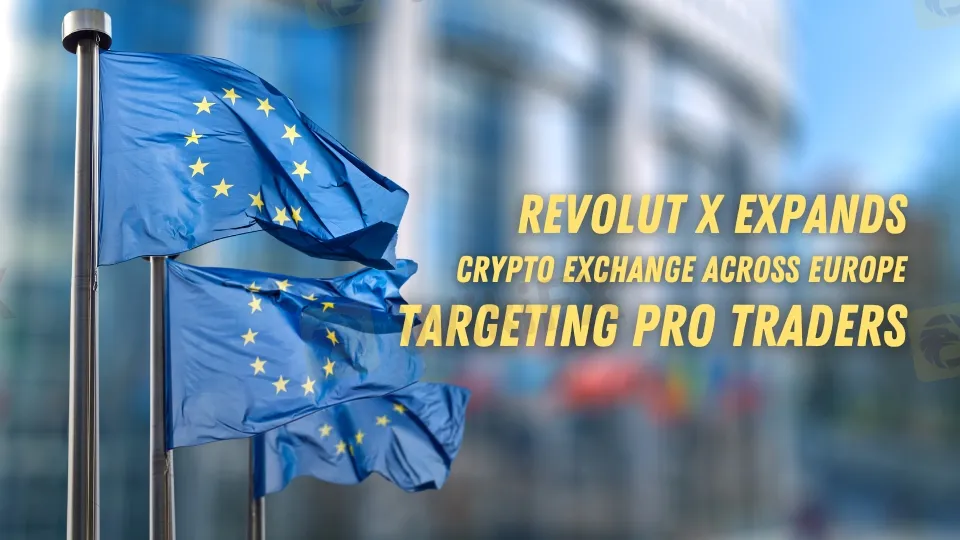简体中文
繁體中文
English
Pусский
日本語
ภาษาไทย
Tiếng Việt
Bahasa Indonesia
Español
हिन्दी
Filippiiniläinen
Français
Deutsch
Português
Türkçe
한국어
العربية
Revolut X Expands Crypto Exchange Across Europe, Targeting Pro Traders
Abstract:Revolut X launches across 30 EEA markets, giving users access to over 200 cryptocurrencies, with advanced tools and competitive fees for experienced traders.

Cryptocurrency-friendly neobank Revolut is ramping up its crypto trading options in Europe with the launch of Revolut X in 30 additional European Economic Area (EEA) markets. Announced on November 13, this expansion makes Revolut X accessible to professional crypto traders and retail investors across all EEA countries, including Belgium, Cyprus, and Denmark, among others.
With this rollout, eligible EEA users can now trade over 200 cryptocurrencies and tokens through Revolut X using their Revolut bank accounts. Revolut X initially debuted in the United Kingdom earlier this year, where it targeted experienced crypto traders with sophisticated features and analytics. Now, Revolut aims to broaden its reach, supporting users across the EEA while maintaining a focus on high-quality tools for crypto enthusiasts.
As with its UK services, Revolut X caters to experienced traders with its advanced trading interface, real-time analytics, and monitoring tools like TradingView. Although the platform is optimized for seasoned users, anyone in the EEA with a Revolut account can join. Revolut X features a competitive fee structure, with zero fees for maker orders and a low 0.09% fee for taker orders. This structure applies uniformly regardless of trading volume, appealing to those looking for cost-effective options in crypto trading.

In terms of security, Revolut X is designed with robust protective measures. Most assets are kept in cold storage, reducing exposure to potential online threats, although Revolut has not disclosed the exact proportion stored in this manner. Revolut's risk management tools are active around the clock to prevent unauthorized access, and the company assures users that only trusted custodians, vetted through rigorous due diligence, are involved in safeguarding assets.
The expansion of Revolut X across Europe underscores Revolut‘s dedication to the cryptocurrency sector. Building on its Revolut Ramp initiative, which facilitates direct crypto purchases via wallets like MetaMask and Ledger, Revolut aims to provide a compelling alternative to established trading platforms. “With Revolut X’s growth, we‘re committed to making a strong impact in the crypto trading market,” said Leonid Bashlykov, Revolut’s Head of Crypto Exchange Product, expressing confidence in the platform's ability to meet the needs of both pro traders and new users.
Final Thoughts
The expansion of Revolut X to the EEA marks a significant step in Revolut‘s mission to innovate within the crypto space. By providing secure, user-friendly trading solutions backed by powerful analytics and robust security, Revolut is positioning itself as a leading choice for crypto traders in Europe. As crypto adoption grows, Revolut’s move into more regions may well set a new standard for accessible and secure digital asset trading.

Disclaimer:
The views in this article only represent the author's personal views, and do not constitute investment advice on this platform. This platform does not guarantee the accuracy, completeness and timeliness of the information in the article, and will not be liable for any loss caused by the use of or reliance on the information in the article.
Read more

Georgia Man Charged in Danbury Kidnapping and Crypto Extortion Plot
Georgia man James Schwab charged in Danbury kidnapping tied to $230M crypto heist. Plot targeted couple for ransom after Miami altercation with son.

Bybit Shuts Down NFT Marketplace Amid Crypto Market Downturn
Bybit announces the closure of its NFT marketplace, citing efforts to streamline offerings. Discover the latest trends in the declining NFT market and its shift to utility-based growth.

Galaxy Digital Settles $200M in Luna Token Manipulation Case
Galaxy Digital pays $200M to settle Luna token manipulation probe by NY regulators, linked to TerraUSD’s 2022 crash, impacting crypto market stability.

April Forex Trends: EUR/USD, GBP/USD, USD/JPY, AUD/USD, USD/CAD Insights
Know April’s forex seasonality trends for EUR/USD, GBP/USD, USD/JPY, AUD/USD, and USD/CAD. Historical insights and key levels to watch in 2025.
WikiFX Broker
Latest News
Exposing the Top 5 Scam Brokers of March 2025: A Closer Look by WikiFX
Gold Prices Climb Again – Have Investors Seized the Opportunity?
Webull Launches SMSF Investment Platform with Zero Fees
Australian Regulator Warns of Money Laundering and Fraud Risks in Crypto ATMs
The Withdrawal Trap: How Scam Brokers Lure Victims into Paying More
FCA to Investors: Think Twice Before Trusting These Brokers
Trump\s tariffs: How could they affect the UK and your money
Trump gambles it all on global tariffs he\s wanted for decades
HTFX Spreads Joy During Eid Charity Event in Jakarta
How Will the Market React at a Crucial Turning Point?
Currency Calculator







